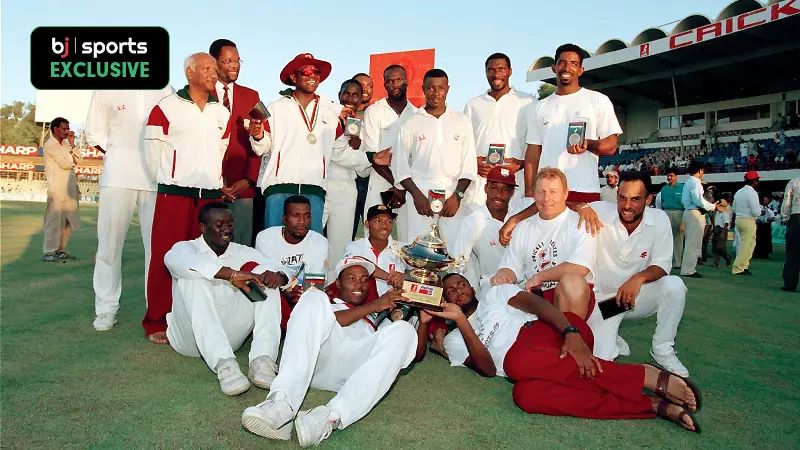
The Caribbean islands of 1992-93 witnessed a clash of titans as the mighty West Indies still basking in the afterglow of their dominant era, locked horns with a talented Pakistan side led by the charismatic Wasim Akram.
The West Indies, under the leadership of Richie Richardson, boasted a team in transition. The legendary quartet of Richards, Marshall, Holding, and Garner had all hung up their boots, leaving a void that younger players like Carl Hooper, Curtly Ambrose, and Courtney Walsh were striving to fill. Pakistan, on the other hand, possessed a well-rounded squad with established stars like Akram, Inzamam-ul-Haq, and Salim Malik alongside exciting prospects like Saeed Anwar and Mushtaq Ahmed.
The stage was set for a fiercely competitive series. The opening Test at the Queen’s Park Oval in Trinidad offered a taste of things to come. West Indies were bundled out for just 127 and a famous victory was in sight for the visitors. However, the Windies fought hard, conceding a lead of just 13 runs. Then in the second innings, they batted extremely well to set Pakistan a huge target of 370. Pakistan could only manage 165 and they went on to lose the game by a mammoth margin.
The second Test at the Barbados Kensington Oval followed a similar pattern. West Indies piled up a score of 455 in the first innings to take control of the game right from the outset. Pakistan could only muster 221 runs in response and they were made to follow on. They batted better but could still manage only 262. West Indies went on to win the game by 10 wickets to secure a series win.
The final in Antigua was a mere formality that ended in a stalemate. It’s fair to say that Pakistan would have lost this game as well had it been a timeless game. The 2-0 series win for the West Indies marked a significant moment in their cricketing history. It signified the successful transition from the legendary generation of the 1980s to a new era spearheaded by Ambrose, Walsh, and Lara. For Pakistan, the series exposed vulnerabilities in their batting lineup, a weakness that would continue to plague them in the years to come.
 Ranking Royal Challengers Bengaluru’s Top 3 buys from IPL 2025 Mega Auction
Ranking Royal Challengers Bengaluru’s Top 3 buys from IPL 2025 Mega Auction Ranking Kolkata Knight Riders’ Top 3 buys from IPL 2025 Mega Auction
Ranking Kolkata Knight Riders’ Top 3 buys from IPL 2025 Mega Auction Predicting Sri Lanka’s top 3 performers for their first Test against South Africa
Predicting Sri Lanka’s top 3 performers for their first Test against South Africa Ranking Chennai Super Kings’ Top 3 buys from IPL 2025 Mega Auction
Ranking Chennai Super Kings’ Top 3 buys from IPL 2025 Mega Auction

